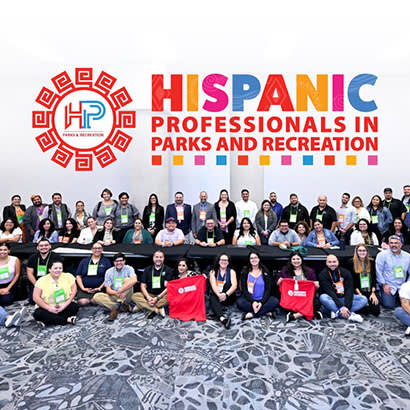
For an enhanced digital experience, read this story in the ezine.
The role of Hispanic professionals in parks and recreation
As we celebrate Hispanic Heritage Month, it is a great opportunity to recognize the rich cultural contributions of Hispanic communities in the United States, including the traditions, history and significant roles these communities play in shaping our nation’s identity and the park and recreation field. This month also allows us to acknowledge the unique challenges Hispanic individuals face in accessing parks and recreation, both as users and as professionals dedicated to serving our communities. Despite efforts to increase Hispanic participation, significant barriers remain. Additionally, Hispanic professionals, eager to develop and implement culturally relevant programs, still face underrepresentation in leadership roles and limited support for their initiatives. By understanding these contributions and barriers and exploring ways each of us can help, we can work toward creating more inclusive and accessible recreational spaces for all.
Connection and Belonging
The Hispanic community is highly diverse, encompassing various cultures, countries and ethnic groups, each contributing unique traditions and experiences. Despite these differences, a shared cultural and language heritage often manifests in distinct recreational activities. Parks frequently become community hubs for family reunions, picnics, religious festivals and cultural celebrations, emphasizing the importance of extended family. Religious festivals and traditional celebrations are pivotal in expressing faith and heritage, transforming parks into vibrant spaces where families strengthen their community bonds. Arts and music offer rich avenues for cultural expression within Hispanic communities. Known for vibrant colors and intricate designs, Hispanic art plays a crucial role in preserving culture and inspiring future generations. Additionally, athletic programs, particularly soccer and baseball, foster a strong sense of community and tradition. Soccer, or fútbol, is a cherished pastime that unites families and friends, while baseball holds significant cultural value, especially in the Caribbean and Central America. These sports activities bridge generations, allowing grandparents, parents and children to bond and connect, reinforcing community ties. Overall, these recreational and cultural activities are vital in fostering a sense of belonging and continuity within Hispanic communities.
Unfortunately, park and recreation agencies may overlook how to effectively serve the Hispanic community, missing opportunities to engage this group. Many neglect to recognize the importance of large family-friendly spaces or may undervalue hosting culturally relevant events. Language barriers and traditional marketing methods often fall short, failing to connect with Hispanic communities. Additionally, logistical and economic barriers, like limited transportation and program costs, can hinder participation.
Elevating Hispanic Voices
During the past two decades, many Hispanic and Latinx professionals have entered the park and recreation field, eager to provide cultural competence skills and bridge gaps. However, challenges remain, such as underrepresentation in leadership roles and limited support for initiatives tailored to Hispanic communities. Despite Hispanics comprising 17.8 percent of the U.S. population in 2023, only 16 NRPA Certified Park and Recreation Executives and 248 Certified Park and Recreation Professionals were Hispanic, representing just 4.4 percent and 4.7 percent, respectively.
In response to these challenges, a group of Hispanic professionals brainstormed the creation of a nonprofit group to empower the Hispanic voice, develop connections, and create a forum for Hispanics in the park and recreation profession. The group first met at the 2022 NRPA Annual Conference in Phoenix, and thus, Hispanic Professionals in Parks and Recreation (HPPR) was born. In a little more than a year, HPPR has grown to more than 400 members, proving the need for such a group. To better understand how to best serve the members of the group, a 2023 survey was conducted and revealed that networking, educational programs and certification opportunities were the most popular needs. In response, the group has hosted several webinars on career options, professional development, social media visibility, CAPRA Accreditation and certification strategies. HPPR also developed a mentorship program, pairing less-experienced participants with mentors based on association, interests and geography. HPPR shares information about member speaking engagements at various local, state, national and international events, maintains a dynamic calendar of such events, and highlights member achievements monthly to inspire the community. Additionally, the group provides a continuously updated list of job opportunities and creates social opportunities for networking.
Advancing Equity
HPPR is just one piece of evidence of why the role of Hispanic professionals in parks and recreation is not only essential to breaking down barriers that exist within Hispanic communities, but also critical to advancing the work of equity and inclusion in the field. Since its inception, this group of Hispanic professionals has established valuable partnerships with various organizations, such as the Ethnic Minority Society, where they share vital information, and NRPA. Together with NRPA, HPPR has been working on translating several certifications into Spanish, developing a ProConnect network, and promoting the “Where You Belong” campaign within the Spanish-speaking community as Donde Pertences. The group has also built connections with state associations and international organizations, including the Asociación Nacional de Parques y Recreación Mexico, the Departamento de Recreación y Deportes de Puerto Rico, and World Urban Parks. These collaborations have expanded HPPR’s network and bolstered support for its initiatives.
Through empowering the Hispanic voice, we can foster a more inclusive environment in parks and recreation, ensuring Hispanic communities have greater access, representation and opportunities to thrive in this field.
For more information on HPPR, visit hppr.online.
Special thanks to the HPPR distinguished advisors: Jesús Aguirre, NRPA board chair; Maria I. Nardi, director of Miami-Dade County Parks, Recreation and Open Spaces Department; Henry Perez Alonso, director of Town of Danville (California) Recreation, Arts and Community Services; Cynthia Aguilar, director of Phoenix Parks and Recreation Department; AP Diaz, superintendent of City of Seattle Parks and Recreation; Homer Garcia, director of City of San Antonio Parks and Recreation; and the unconditional support and mentorship of Chris Nunes, chief operating officer at The Woodlands Township in Texas).
Juan Acevedo, Edwin Rivera-Guzman, Eric Lòpez, Tony Salinas, Angie Encerrado Rance, Matt Martínez and María Cepeda are HPPR Board Members.

